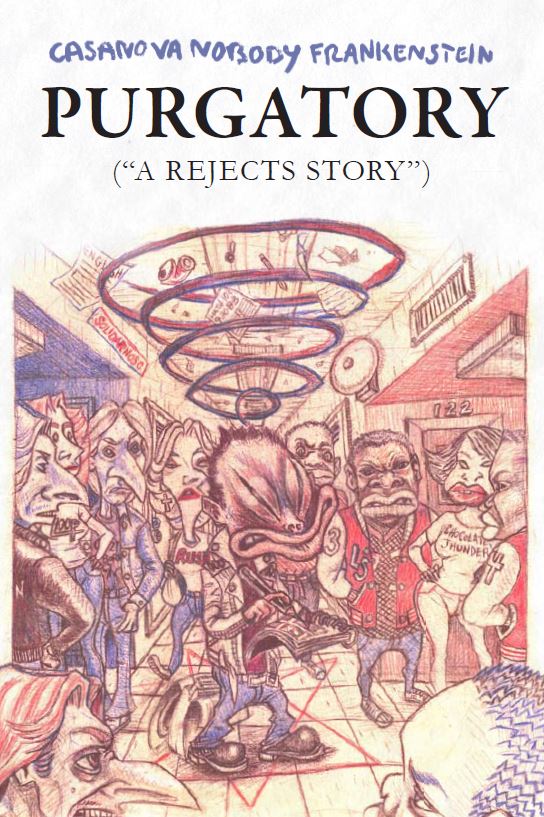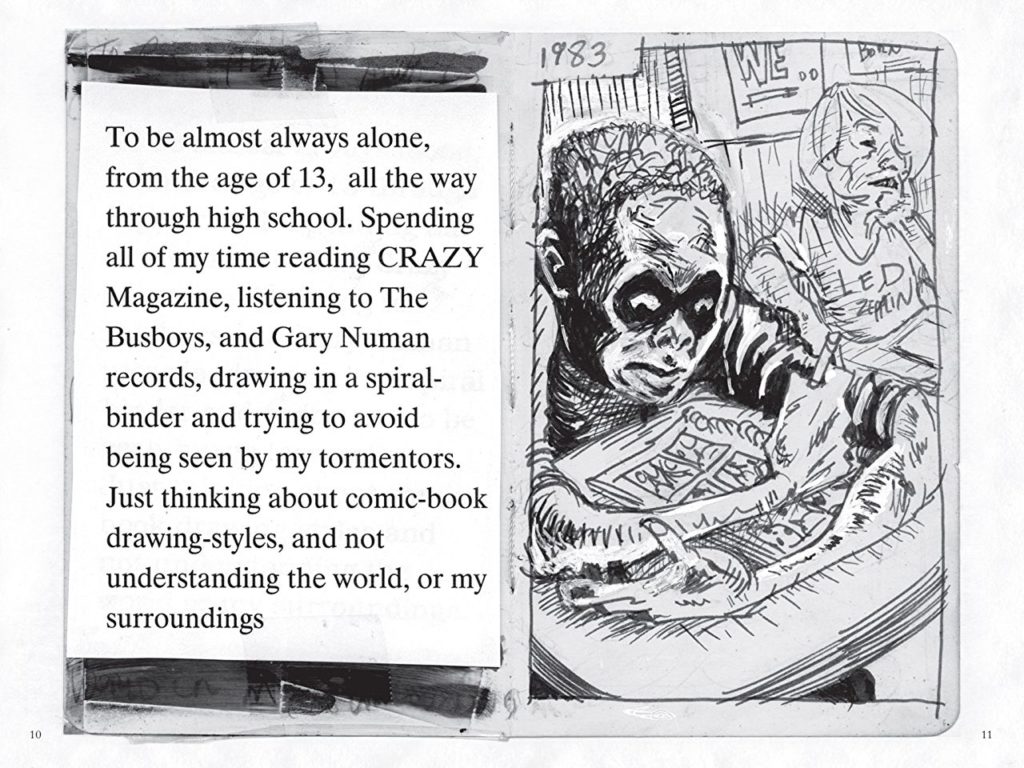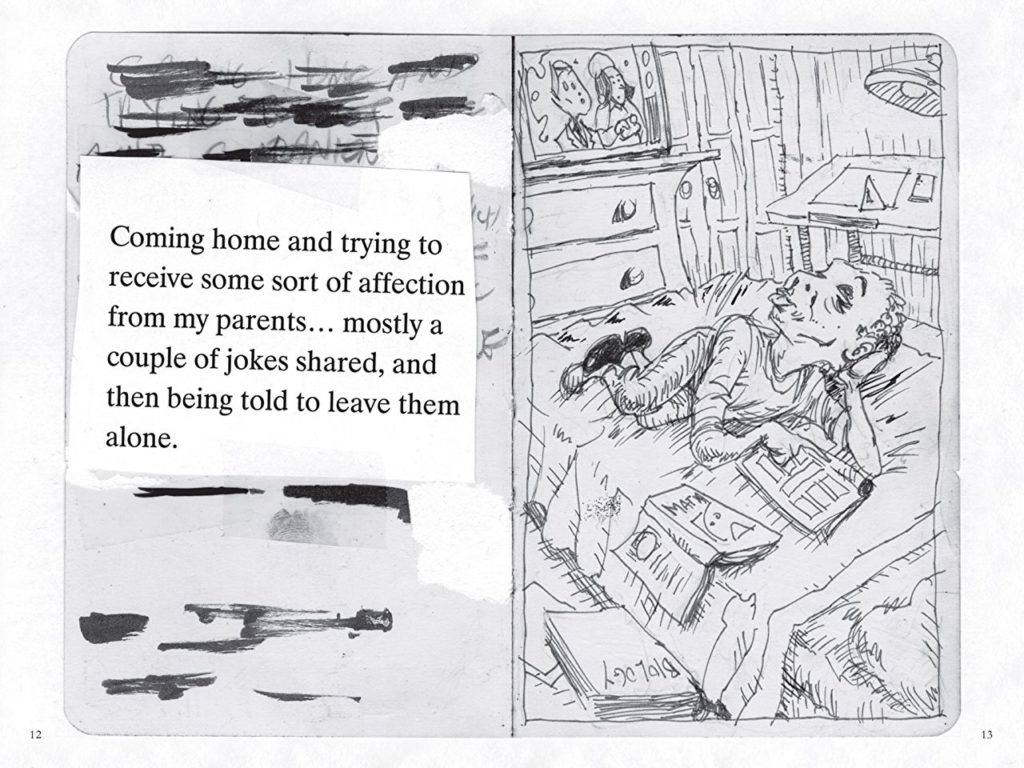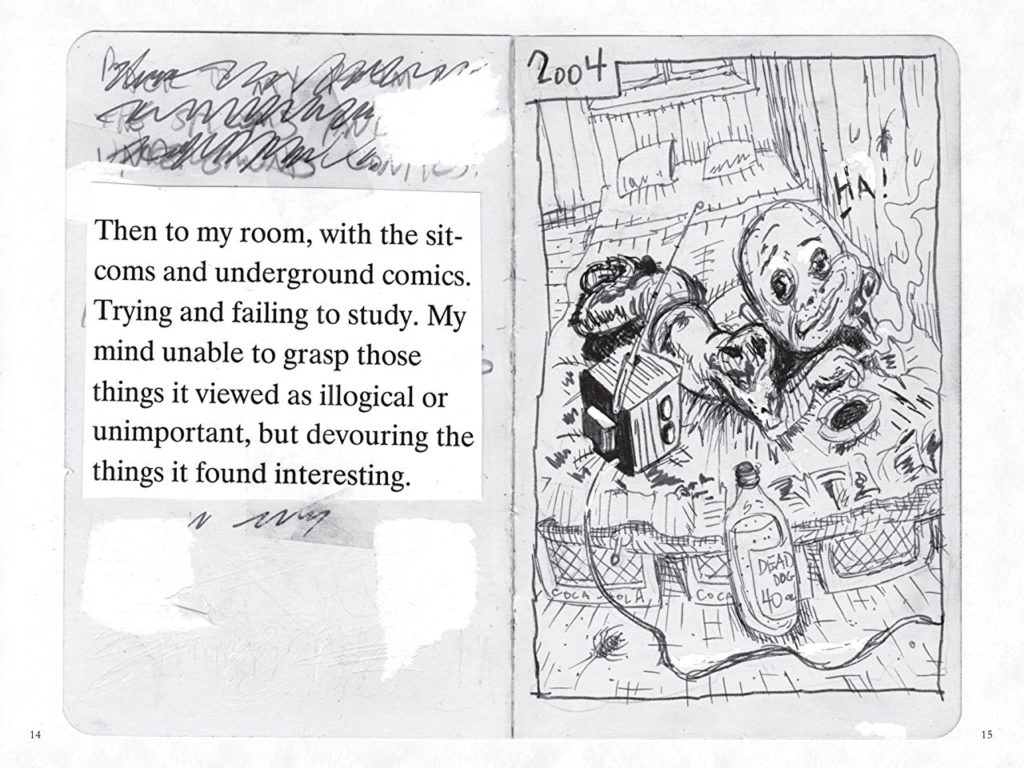
A couple of years back, the cartoonist formerly known as Al Frank, new moniker of Casanova Frankenstein in tow, burst back onto the alternative/independent/underground scene with the sixth issue of his long-dormant (how long? Try two decades) series The Adventures Of Tad Martin, and my mind was flat-out blown. A harrowing, brutally honest, emotionally naked, scream-from-the-gut autobiographical tale of the hellishly bad marriage, drug addiction, health problems, and psychological issues that had consumed his life in then-recent years, drawn with anything that was handy on anything that was handy (mostly composition book pages, but restaurant guest checks, napkins, and even the back of prescription labels would do in a pinch), it did considerably more than scratch the itch many of us had been suffering from for years with the absence of new autobio material from masters of the form such as Chester Brown, Joe Matt, and others, and effectively raised the stakes (by plumbing the depths) of the “confessional comic” to levels not seen before or, sadly, since. I speak with no hyperbole whatsoever when I say that The Adventures Of Tad Martin #sicksicksix is one of the five or ten best single-issues I’ve ever read in my life, and I’ve honestly lost count of how many times I’ve re-read it since.
It’s fair to say, then, that I was absolutely over the moon a couple of months back when I saw that Frankenstein — now with a conspicuous “Nobody” inserted into his nom de plume — was taking a much shorter break between publications this time around, and that another “comic” written and drawn during his “wilderness years” entitled Purgatory (A Reject’s Story) would soon be in our unworthy hands thanks to the Fantagraphics Undergound (FU? Get it?) imprint of Fantagraphics Books. Pre-publication announcements let it be known that the writer/artist’s tortured high school years were going to be the subject of his latest “visual memoir,” and having seen how he somehow managed to survive what could (hell, perhaps should) have been his own personal “omega” in his last book, the promise of seeing his “alpha” play out on the page sounded like a very enticing one indeed. It wouldn’t be easy reading by any means, I was sure, but necessary? Abso-friggin’-lutely.

Frankenstein again eschews even any nods toward dull conformity in the pages of Purgatory, relating his tale by means more akin to scrawling than actual drawing, and for those of us tuned into his wavelength, I gotta say, we wouldn’t have it any other way. One of the mainstays of his youth, as related in this tale, was a desperate desire to not only learn how to illustrate comics books but to learn how to illustrate them well, but at some point he thankfully threw all that out the window and instead decided to go the “primal scream” route with his artwork — raw, brutal, absolutely honest, and completely unflinching. In short, the only kind of art that can possibly convey the kinds of stories he excels at telling. Some people draw because they can — Frankenstein draws because he has to, conventional (and hopelessly dated) definitions of “ability” notwithstanding. To draw a cinematic parallel, if formally near-flawless works like Watchmen are comics’ CITIZEN KANE, latter-day Frankenstein works are the funnybook equivalent of Buddy Giovinazzo’s Combat Shock — low-budget, ugly, utterly uncompromising “guerrilla” works that force you to meet them at their level and, in doing so, point out the essential soullessness of most corporate, “mainstream” works. Lots of people are better at making comics than Frankenstein is — but very few actually make better comics.

The one thing that most obviously distinguishes Purgatory from Tad Martin SickSickSix is its surprisingly hopeful resolution, wherein our tormented artist-to-be simply splits his hometown of Chicago for presumably greener pastures, but the pages preceding this almost-happy are as challenging to navigate as Tad’s tale of woe was — and every bit as rewarding. Frankenstein leaves it all on the fucking page, playing psychotherapist to himself in full view of the public, refusing to flinch when most of us almost certainly would and shoving our faces in the stew-pot of bullying, racial animus, family alienation, and scaled-down Walter Mitty-esque escapism that defined his formative years. Will you want to close the book up and turn away? Possibly. Will you be able to? Don’t kid yourself. Compelling is an understatement when it comes to describing this work.

I do have one major gripe about this book, though, and it’s both absolutely no fault of the artist’s whatsoever, and points to a much larger problem currently afflicting the independent comix scene — while Purgatory would (and, I would contend, should) make for one hell of a “stand-alone” single-issue “floppy,” the format it’s presented in absolutely sucks and is very poor value for money. 90-ish pages of single-panel illustrations laid out in a small-format publication that could quite literally fit into the palm of a large person’s hand — for twelve bucks? Are you serious, Gary Groth? I know that FU is a self-described “micro-imprint” and that the print run for this thing probably doesn’t even run into the four digits, but at that price, Frankenstein will be lucky if any more than three or four hundred copies of his book are moved, and that ain’t gonna be enough to get him out of the janitorial business anytime soon. I’ve long maintained that the so-called “alternative” publishers are doing both themselves and their artists real harm by moving away from the “floppy” format, but never has that been more apparent than it is here. If this material were published in the traditional format of a cheap B&W newsprint comic (as was the case with Tad Martin sicksicksix), at least a copy or two would be available at every LCS in the country, and it would probably sell through its small print run. This expensive “mini-book” thing they’ve got going here, though, is hardly something that most retailers are going to be willing to take a flier on, given that it can’t really be shelved with either standard comics or graphic novels/trades, and represents too much of a financial risk for today’s cash-strapped store owners to gamble on. In short, this is amazing, daring, thoughtful, and highly memorable work that unquestionably deserves to be seen by as large an audience as possible (even if that’ll still be a pretty damn tiny one), but the book’s very own publisher has essentially guaranteed that isn’t going to happen.
For my own part, though, what can I say? While I wasn’t happy to fork over this much of my hard-earned cash on a product this physically slight, I’d still to it again in a heartbeat, and I heartily recommend that you do the same. Purgatory (A Reject’s Story) may very well prove to be the best comic of the year — presented in the worst format of the year. There may be something poetically “right” about that at the end of the day, even if it proves that rejects, losers, and outcasts really can never catch a break.
Tags: Al Frank, Casanova Frankenstein, Columns, Comic Books, Comics, Fantagraphics Books, Fantagraphics Undergound


No Comments